Have you also heard of the plant with the mysterious name maca, also known as Peruvian ginseng? You may even have it on your shelf at home, as it has gained many fans over the years. It is an interesting plant with a significant proportion of bioactive substances, the effects of which can be felt, for example, in your athletic performance or fertility. What are its other benefits?
In this article you will read about the effect of maca on these areas:
What is maca?
The Peruvian Maca (Lepidium peruvianum or Lepidium meyenii), also called Peruvian ginseng, Brazilian ginseng, Peruvian cress or simply maca, is an exceptional plant that grows primarily in the Peruvian Andes at altitudes of 2,800 to 5,000 metres above sea level. It is thus a hardy plant that is not challenged by hard frosts, snow or low oxygen levels.
Maca has been known and loved for centuries, and is a constant in traditional medicine. Its effects are due to its numerous beneficial substances, thanks to which it is now even classified as a superfood. Its nutrients and benefits were recognised by the indigenous inhabitants of the high mountain regions of the Peruvian Andes some 2000 years ago. [12]
Interestingly, this plant belongs to the brassica family of vegetables, which also includes for example broccoli, cauliflower and cabbage. There is not just one type of maca, but several varieties. You may come across red, yellow, purple or black maca. However, the most widespread and most widely used worldwide is yellow, and in any case, the root is the most used. Each species differs slightly in its content of biologically active substances and so may also have slightly different effects. [12]

What are the health benefits of maca?
1. It has antioxidant properties
Maca contains a mixture of various bioactive compounds, many of which act as antioxidants. For example, phenolics, alkamides or glucosinolates.
Thanks to the effects of these substances, maca helps to fight free radicals, which are produced by oxidative stress. This can occur, for example, as a result of smoking or excessive exposure to UV radiation, which can further lead to premature skin ageing.
Some studies have even shown that certain substances contained in maca (e.g. macamides) have an effect on tumour cells and may limit their growth.
In addition, thanks to its antioxidant properties, maca may be useful, for example, in athletic sports where muscle damage occurs. In fact, it can help to better manage muscle fatigue. [1,12]
Antioxidants generally play an important role in the prevention of chronic diseases that are related to oxidative stress and inflammation in the body. Thus, maca can be a useful part of an overall healthy lifestyle that can help you stay physically fit, healthy and stay in shape. [6]
2. Positive effect on brain and cognitive abilities
One of the most well-known effects of maca is its positive effect on the brain. Not only is it involved in the protection of nerve cells, but it may even be useful for the memory or other cognitive functions. These include, for example, the ability to learn, concentrate or maintain attention.
How does maca affect the brain?
- Studies show its effect on improving cognitive functions such as memory or learning. [7,12]
- Its antioxidant effects also seem to be involved in the protection of neurons (nerve cells). [7]
- For example, macamides could have a protective effect on nerve cells. These help to promote the processes that lead to nerve cell growth. [12]
- In addition, it turns out that maca could alleviate brain damage caused by beta-amyloid plaques (clumps of proteins). These typically accumulate in the brain in Alzheimer’s disease. [16]
- Studies are also showing a possible effect in other neurodegenerative diseases (Parkinson’s disease, Huntington’s disease). [16]
If you want to support brain health and improve your memory, concentration or other cognitive functions, maca could be an option for you. Its properties make it ideal when you’re working or studying hard or dealing with complex tasks. It can also help with brain health as well, as part of a healthy ageing and anti-ageing approach.
If you want to know what other substances can boost your brain function, be sure to read our article Nootropics: Substances to Improve Concentration and Memory. Which Are the Best?

3. Can improve sports performance
Studies also report positive effects of maca on athletic performance, especially in terms of endurance activities and muscle recovery.
How does maca affect sporting performance?
- The use of maca is said to have an energising effect. This could potentially result in better endurance performance.
- In some studies, an effect on hormonal balance has also been observed, specifically on sex hormone levels ( oestrogen, testosterone, etc.). Maintaining optimal levels is essential for the body, as an upward or downward deviation can manifest itself in various problems. [8]
- The antioxidant properties of maca could help with muscle recovery, which may reduce muscle damage after exercise, for example.
- Maca is also known to have promising effects on relieving fatigue. [12]
You might be interested in these products:
A scientific perspective on maca: What effect does it have on cycling performance?
In the study, researchers followed a group of eight cyclists. Half of them took 2g of maca per day for two weeks, while the other half consumed a placebo in the form of Arabic gum. The groups were then swapped and those taking the placebo were given maca and vice versa.
The aim was to find out if maca had an effect on their cycling performance. Therefore, they completed a 40 km race before the start of each stage and repeated it after the end of each stage. It turned out that their race time was better after taking maca than without it. Performance improved by a full minute on average. While this may seem like a negligible amount at first glance, in reality, every second counts in endurance races. [14]
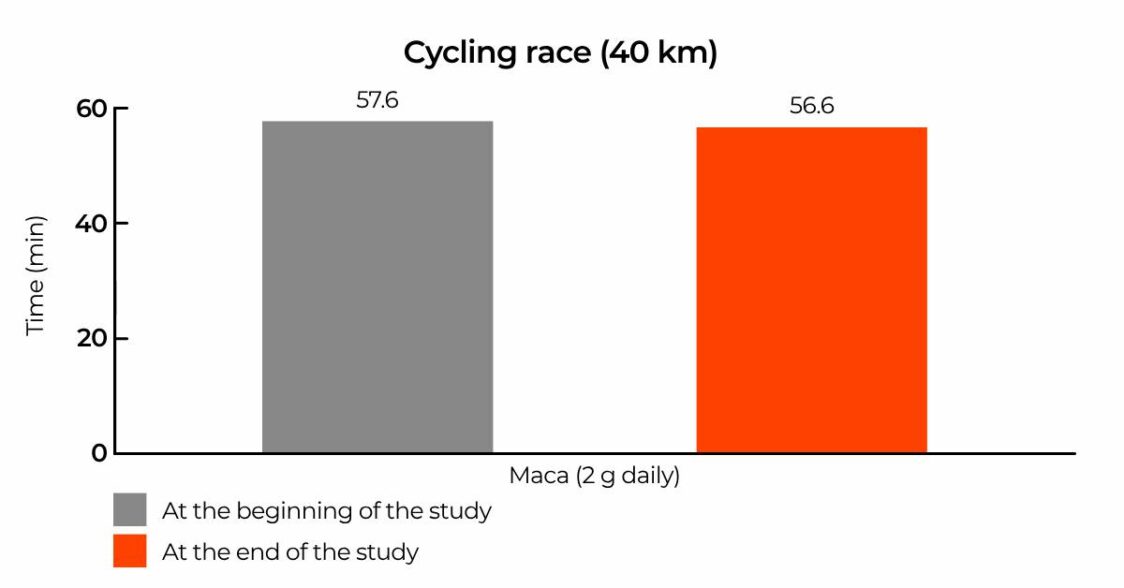
From research available, it seems that maca could be useful if you are involved in endurance as well as strength sports. This could include not only cycling, but also running, strength training or intense activities such as crossfit. Maca may be involved in the processes related to athletic performance, recovery or fatigue management.
If you want to know how else to support your endurance performance, just have a quick look at our article on the 11 Greatest Dietary Supplements for Running, Cycling, and Other Endurance Sports.
4. Can enhance libido and sexual health
Maca has been used in the past to support fertility or libido. It is now also being shown in research that it could actually have a positive effect on these areas of one’s sex life.
The impact of maca on sexual health and desire for sex
- The effect on libido is often apparent in both men and women, and often, for example, in menopausal women. [19]
- It is also likely to have an effect on hormonal balance, which is also related to better sexual function.
- It also might possibly help with erectile dysfunction. [4,15]
- Actions to relieve stress can also translate into a higher desire for sex and intimacy.
Discover our bestsellers:
A scientific perspective on maca: What effect does it have on libido?
One study followed a group of 57 healthy men over 12 weeks. They were divided into three groups, with one group taking 1.5 g of maca daily, the second taking 3 g, and the third receiving a placebo. The researchers tracked the effect of maca on libido – participants rated it by giving a score (e.g., a value of 1 = no change, a value of 3 = slight increase, etc.). The study found that after twelve weeks of follow-up, men taking maca (at both doses) experienced an approximate 40% increase in libido. [2]
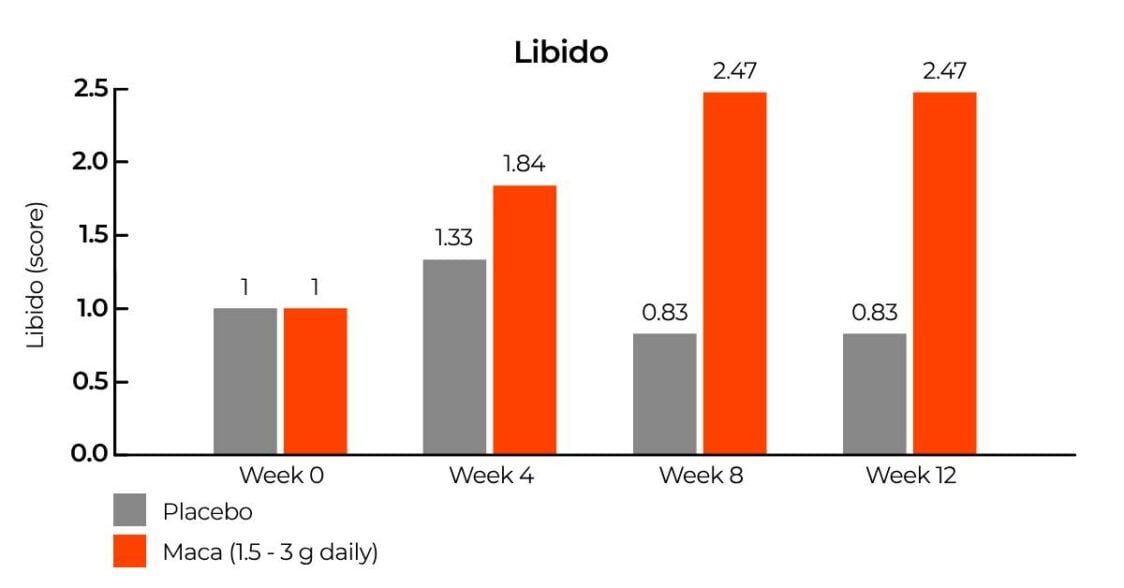
In the event that you want to boost your sexual health and increase your desire for sex, maca could be the aphrodisiac worth trying.
5. Effect on women’s health
Maca is a plant that is appreciated by many women as it proves to be helpful in terms of menopause, the menstrual cycle and overall hormonal balance.
How can maca improve women’s health?
- It could relieve some of the symptoms of menopause, such as hot flushes or night sweats. [15]
- Its effect is also seen in menopause-related psychological problems, such as depressive states or anxiety. [4]
- It also appears that it can help to optimise hormonal balance during menopause. [5,15]
- Available studies suggest that it could also help with increasing oestrogen levels. [5]
From resources available so far, it seems that maca may also be suitable if you need help with menopausal symptoms. Thus, it may be the supplement that could make this period a little more bearable for you.
If you’re wondering what other substances will help with women’s health care, don’t overlook our article Women and Nutrition: ‘The Most Important Vitamins and Minerals for Health and Beauty’.
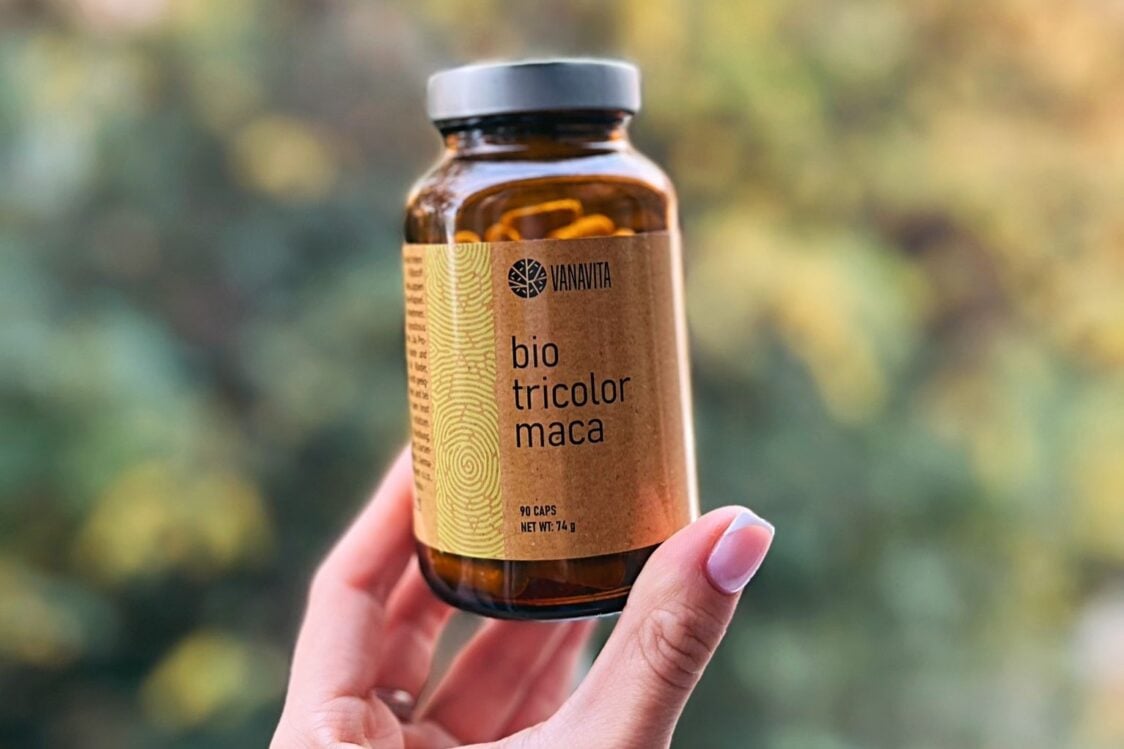
6. It has an effect on male health and fertility
The use of maca is popular and widespread among men, as it is known for its benefits on fertility and testosterone.
How can maca improve men’s health?
- Studies suggest that it has a positive effect on sperm quantity and quality (morphology). [15]
- It is also apparently involved in improving sperm mobility (motility). Greater sperm motility means better sperm activity and a greater likelihood of fertilising the egg.
- Maca is associated with optimal hormonal balance not only in women, but also in men.
- Apparently, it can also help with achieving optimal testosterone levels. [11]
- It has also been shown to have a positive effect on prostate health.
As you can see, it turns out that maca can be beneficial for men’s health as well. Not only is it useful in helping to care for the prostate, but also for optimal testosterone levels. The latter is an important male hormone that affects both the muscles and the overall vitality of the male body. Along with its effect on the quantity, quality and motility of sperm, maca is thus an interesting plant that could come in handy in promoting fertility.
Our article Men and Nutrition: The Most Important Vitamins and Minerals for Health, Testosterone and Performance will explain more about the substances that men’s health will appreciate.
A scientific perspective on maca: What effect does it have on sperm quality?
A group of researchers looked at the effect of maca use on sperm quality in eighteen healthy men in a study. Eleven of them took 1.75 g of maca for twelve weeks, while the remaining seven were given a placebo. The aim was to see if maca had an effect on sperm quality and count. It turned out that taking maca increased sperm concentration, or the number of motile sperm, by an average of 14%. [9]
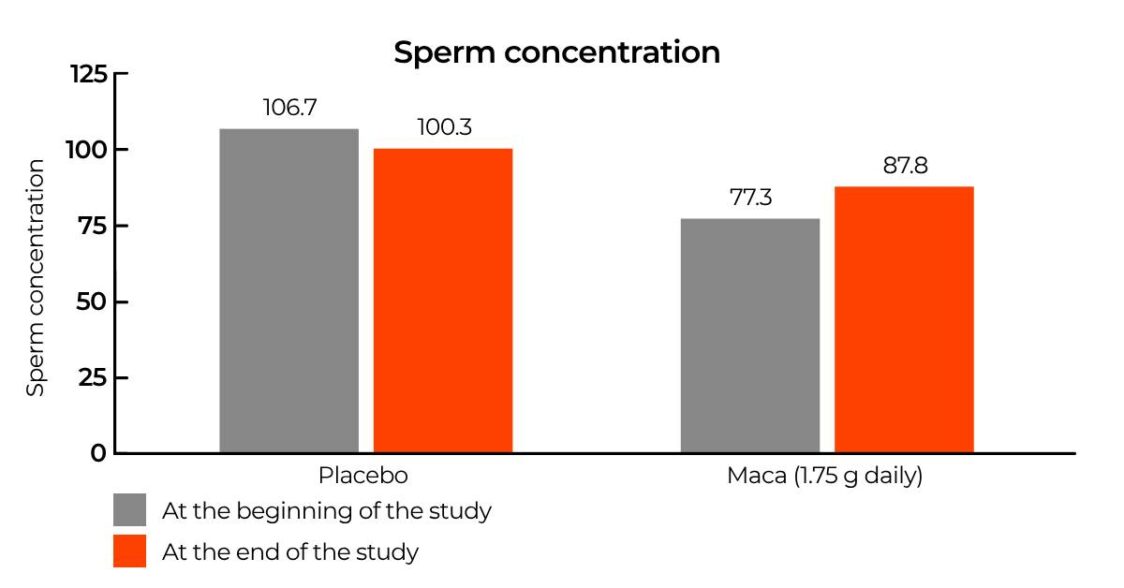
7. Can improve mental health
The effect of maca on nerve cells and the brain can also be reflected in mental health. This plant is known for its promising effect on improving mood and overall psychological well-being. Studies also show that the amount of energy felt after taking it can increase. It could even have a positive effect on sleep and even help to cope better with stress. [3,16,19]
In scientific papers, its contribution to the alleviation of anxiety or depressive states, for example, is also discussed. Thus, according to the results of these studies, maca appears to have antidepressant and anxiolytic effects. [10,13,19]
Therefore, if you’re looking for a herbal supplement to help you cope with daily mental strain and stress, maca may be a worthy candidate. You would do well to combine it with a healthy lifestyle, other stress management techniques or a range of other adaptogens such as the popular ashwagandha.
Other possible health benefits
- It could also play a role in the prevention of osteoporosis during menopause, which is linked to low oestrogen levels, and which studies suggest maca could help optimise. [4]
- It is also demonstrating its potential effect on type 2 diabetes. In fact, in studies, an effect on increased insulin secretion has been observed. [12]
- It seems that maca could also have an effect on improving blood pressure levels. [19]
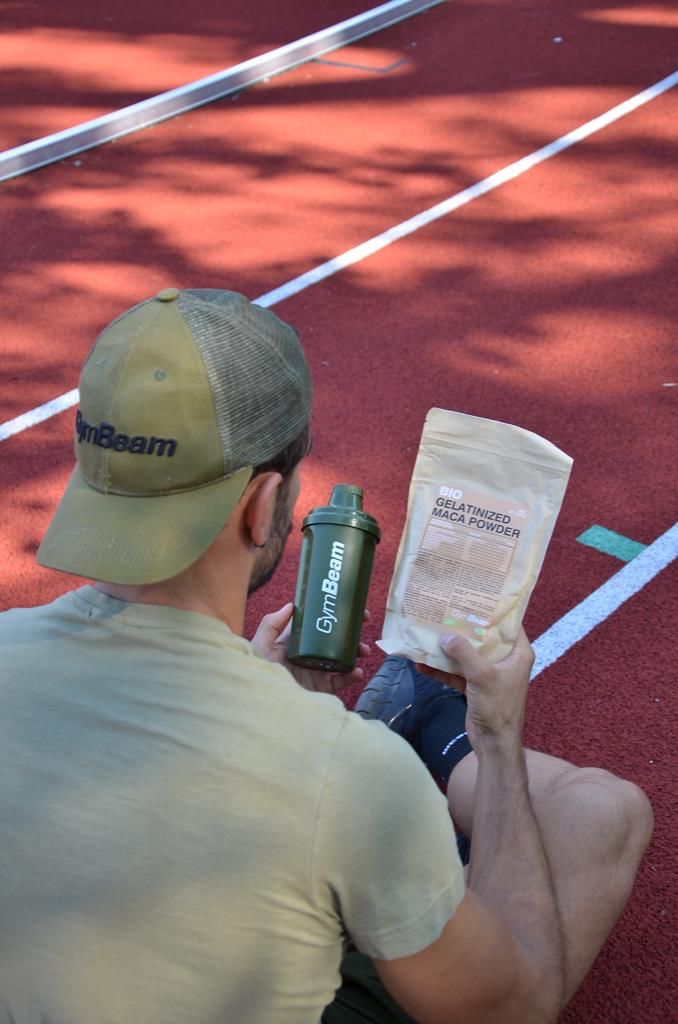
What does maca contain?
Now that you know the various benefits of maca, you can then look further at which substances are responsible for them. This is an interesting list, because maca contains a diverse combination of macronutrients, micronutrients and other bioactive substances. [15]
The nutritional value of individual maca products may vary slightly, depending on the variety or growing conditions, but they are basically a mixture with a similar proportion of beneficial nutrients. The composition of the different coloured varieties also varies slightly, but in general the differences are not too extreme. [15]
What are the main compounds of maca?
- Carbohydrates: Found mainly in the form of starch, they make up about 46-75 % of the dry weight of maca root ( a similar content is also found in sweet potatoes). [15]
- Fibre: This is a combination of soluble and insoluble fibre, accounting for approximately 17-26 % of the dry weight of maca root. [15]
- Protein: Maca root contains an average of 9-22% protein. [12,15]
- Fats: These make up roughly 2% of the total weight of maca root. [19]
What other micronutrients and bioactive substances does it contain?
- Minerals: It has considerable amounts of potassium, calcium, magnesium, sodium, iron, zinc and copper, for example.
- Vitamins: These include vitamin C, vitamin B1 (thiamine) and vitamin B2 (riboflavin).
- Polyphenols: These substances are well known for their antioxidant properties.
- Macaenes: These are unsaturated fatty acids typical only for maca. [19]
- Alkaloids: The most abundant and best known are the macamides, which are responsible for many of the positive benefits of maca. For example, its influence on the protection of neurons. [15,16]
- Glucosinolates: These are substances typical of brassicas that give them their typical taste and aroma. [15]
- Phytosterols: Plant components that are known for their positive effect on lowering LDL (bad) cholesterol. [4]
- Tannins: These substances have been described as having an anti-inflammatory effect. [4]
How to take maca?
In the case of maca, there is no generally recommended dosing protocol to follow. However, the most common recommended dosage is in the range of 1500 – 3000 mg per day. This dosage is also commonly encountered in studies and is either taken as a single dose or divided into several daily doses. [17,18]
Maca is available on the market in various forms. For regular use, it is mainly in powder or capsule form. If you want to try more varieties of maca in one product, you can reach for our Tricolor Maca.
This plant can also be eaten in the form of flour or as an ingredient in various chocolates. In combination with cocoa, it can also be enjoyed as part of our Cocoa & Maca drink, which is a great alternative to coffee or hot chocolate.
How long should one take maca?
There is no specific recommendation on how long to take maca. Since there are no adverse effects associated with maca, it is considered to be safe to take it for longer periods of time within the recommended dosages.
With what do you combine maca?
As you can see, maca has many promising benefits that your body will appreciate. However, it’s effect could be even more noticeable when combined with other active ingredients.
What can you do to support each area of health?
Can maca have adverse effects?
There are no significant negative effects associated with maca. However, it is recommended to consume it only in its processed, not raw form, so that it does not cause digestive problems. [17]
What is the lesson?
Maca and its benefits were known and used by the indigenous people of the Peruvian Andes. Today, its effects are under the magnifying glass of many scientists and we know a little more about its health benefits. Although the research is far from over, we can say that it can be useful for brain health, fertility, testosterone levels and mental health, to name a few.
Did the article provide you with new and interesting information? Don’t forget to support us by sharing it with your family and friends.
Sources:
[1] FEI, W. et al. Antioxidative and Energy Metabolism-Improving Effects of Maca Polysaccharide on Cyclophosphamide-Induced Hepatotoxicity Mice via Metabolomic Analysis and Keap1-Nrf2 Pathway. –
[2] GONZALES, G.F. et al. Effect of Lepidium meyenii (MACA) on sexual desire and its absent relationship with serum testosterone levels in adult healthy men. –
[3] GONZALES-ARIMBORGO, C. et al. Acceptability, Safety, and Efficacy of Oral Administration of Extracts of Black or Red Maca (Lepidium meyenii) in Adult Human Subjects: A Randomized, Double-Blind, Placebo-Controlled Study. –
[4] CHEN, R. et al. A review of the study of active components and their pharmacology value in Lepidium meyenii (Maca). –
[5] LEE, M.S. et al. Maca (Lepidium meyenii) for treatment of menopausal symptoms: A systematic review. –
[6] LOBO, V. et al. Free radicals, antioxidants and functional foods: Impact on human health. –
[7] MALÍK, M. – TLUSTOŠ, P. Nootropic Herbs, Shrubs, and Trees as Potential Cognitive Enhancers. –
[8] MEISSNER, H.O. et al. Hormone-Balancing Effect of Pre-Gelatinized Organic Maca (Lepidium peruvianum Chacon): (I) Biochemical and Pharmacodynamic Study on Maca using Clinical Laboratory Model on Ovariectomized Rats. –
[9] MELNIKOVOVA, I. et al. Effect of Lepidium meyenii Walp. on Semen Parameters and Serum Hormone Levels in Healthy Adult Men: A Double-Blind, Randomized, Placebo-Controlled Pilot Study. –
[10] RUBIO, J. et al. Effect of three different cultivars of Lepidium meyenii (Maca) on learning and depression in ovariectomized mice. –
[11] SANTOS, H.O. et al. Beyond tribulus (Tribulus terrestris L.): The effects of phytotherapics on testosterone, sperm and prostate parameters. –
[12] SILVA LEITÃO PERES, N. DA et al. Medicinal effects of Peruvian maca (Lepidium meyenii): a review. –
[13] STOJANOVSKA, L. et al. Maca reduces blood pressure and depression, in a pilot study in postmenopausal women. –
[14] STONE, M. et al. A pilot investigation into the effect of maca supplementation on physical activity and sexual desire in sportsmen. –
[15] WANG, S. – ZHU, F. Chemical composition and health effects of maca (Lepidium meyenii). –
[16] ZHU, H. et al. Macamides: A review of structures, isolation, therapeutics and prospects. –
[17] Maca benefits, dosage, and side effects. –
[18] Maca Uses, Benefits & Dosage – Drugs.com Herbal Database. –
[19] Research Breakdown on Maca – Examine. In – online]. [cit. 2023-10-23]. Dostupné na internete: [research/#8lrrkl9-neurology









































